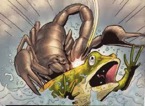The Scorpion and the Frog
Sunday, June 14, 2015 - Filed in: General Interest

A scorpion enlists a frog to take him on his back across a stream, even though the frog is astute enough to protest that the scorpion "will surely sting me and I will die." The scorpion points out that if he stings the frog, he will die too. The trusting frog thus takes on his passenger, is stung by him, and the two creatures drown together. But before the frog drowns he asks, "Why did you sting me, Mr. Scorpion, even though it costs us both our lives?" to which the Scorpion replies, acceptingly, "It is my nature."
Recently our peace-embracing president won the Nobel Peace Prize and expanded a war in Afghanistan on the same day. Are we, even the very best of us, killers by nature? Are we peacemakers, as we see ourselves, or war mongers, as some see us? Are we doomed to self destruct, wasting our lives, our families, our country, our planet?
In many an American war movie, a naïve soldier in a choke of patriotism expresses the desire to die for his country out of a desire to keep the other fellows from winning something or other. To that, his older and wiser superior suggests it is a better idea for him to get the guy in the opposite uniform to die for his. We naively applaud Pyrrhic victories, those achieved at a ruinous, suicidal cost by the more romantic great lovers of history, like Romeo and Juliet, or Butch Cassidy and the Sundance Kid, who want to enter the pearly gates hand in hand.
In the greatest of war movies, the most tear jerking ones like GALLIPOLI or GLORY, PLATOON, DEER HUNTER or ALL QUIET ON THE WESTERN FRONT, the characters we are cued to love are doomed to die, whether they want to or not. But is it our nature to seek our own death and, incidentally the death of the adversary we embrace till the last breath? In the culmination of our incomplete life, do we embrace ultimate acts of cockamamie heroism? Our repertoire is so wide, damned near anything is in it, but we get to choose what we will do and thus who we will be. Those fearing death may seek something or someone to die for, the theory of it may seem heroic. It may be the closest people can come to immortality, if they have no grandchildren and don't anticipate playing a harp atop a cloud forever.
Many of the people who enlist in the military have little concept of what the war is about, who they are killing and who is trying to kill them. Most of the people who fall in love have done little psychological testing to determine who or what they are getting into. They may be in love with the idea of being in love, or they may be just taking charge of the process or throwing away their life.
At the height of the cold war, in DR.STRANGELOVE OR HOW I LEARNED TO STOP WORRYING AND LOVE THE BOMB, American and Russian leaders meet to discuss peace. As they do, they point their "doomsday devices" at each other, watching to see who will explode the planet first.
Is this the nature of human beings, seeking glory or scars or medals, or dominance on the way to the grave? Do we feel free to destroy creatures of a different stripe? Are we scorpions by nature as well as frogs. Is our very presence on a frog's back a provocation, a challenge to a contest? If life itself is a competition, what is the prize?
Whatever our nature, we are not at the mercy of it. Just because we feel lust, does not mean we just jump the bones of whoever tickles our fancy; just because we feel anger, does not mean we get a free shot at whoever offends us. We need not marry everyone we love, or even jump everybody that turns us on. We need not pulverize everyone we dislike. Unlike guileless frogs and treacherous scorpions, we are not at the mercy of our natures. We have to keep in mind that we are always making choices. Of that, and that alone, we have no choice. We are capable of just about anything, so in contrast to Malcolm Gladwell, we must always think before we blink.
Note: This a reprint of an article by Frank Pitman, MD appearing in Psychology Today.
